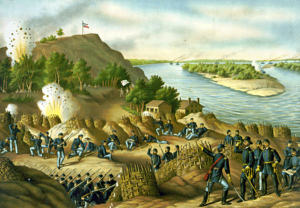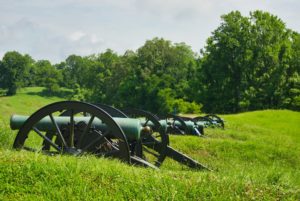
From the start of the Civil War, the Union knew its fortunes relied heavily on control of the Mississippi River. That, in turn, made Vicksburg of great strategic importance. As Federal forces descended on the city in 1863, there was a sense that the war was about to enter a new phase, one that would soon lead to the Confederate’s ultimate defeat.
Historian Tim Smith will tackle this seminal point in the Civil War during his upcoming tour, “Fortress Vicksburg.” A native of Mississippi, he knows the challenging landscape as well as anyone. Hosting a tour in what feels like his backyard is a thrill Smith isn’t taking for granted.
“It’s a dream come true,” he says. “We used to go to Vicksburg and Shiloh numerous times a year, and that I had ancestors inside Vicksburg makes it even more special. It helps a lot to have grown up in the surrounding area, especially with knowing the lay of the land and the outer portions of the Vicksburg campaign, which of course stretched far away from Vicksburg itself, actually into multiple states.”
“Fortress Vicksburg” is slated to run from November 16 to 20. With BGES Covid protocols in place, Smith hopes the tour will come off without a hitch. He sat down with us to discuss what attendees can expect.
BGES Blog: “Fortress Vicksburg” focuses on the Union efforts to take the city in 1863. Lincoln saw the campaign as crucial to the North’s success in the Civil War. Why? What made Vicksburg such a prized location?
TS: The major reason was the Mississippi River, which had been a tenet of Union strategy the entire war. Gradually, the Federals had chipped away at taking portions of it both on the northern and southern ends, and Vicksburg by 1863 was about all that was left in the middle. Cutting off the trans-Mississippi by taking Vicksburg and opening the Mississippi River would split the Confederacy and deprive them of all the assets in the region west of the river.
Obviously, these issues are big but have been argued over since the war itself, but any open-minded person can see that the fall of the Mississippi River was a big deal. Also making Vicksburg important was its defensibility. There was no good way even to get to Vicksburg (which took Grant nearly seven months), and then he had to actually take it.

BGES Blog: The tour spans four days. Give us an idea of the itinerary.
TS: We will spend all four days examining the terrain and topography of Vicksburg itself, as we delve into the assaults on May 19 and 22, and then the siege operations until July 4. We’ll follow the tracks of the major assaults and then the lines of advance during the siege, mostly the various Union approaches that went forward during the siege operations. It will be up and down through ravines and creeks that most visitors don’t see, so dress accordingly. It will be a heavy, hard hiking tour.
BGES Blog: As you mentioned, you’ll be making your way through the same imposing earthworks and hilly terrain that Union forces had to traverse. It was a difficult mission for them. How did they deal with the challenges they faced?
TS: They dealt with them by going through them, just like we will do. You can’t understand Vicksburg until you understand the terrain, and we will seek to do that. We will tromp where they did, over ridges and through ravines in an effort to gain at least some inkling of what it must have been like. Fortunately, we won’t be digging approaches, and no one will be shooting at us.

BGES Blog: You’ve written several books on Vicksburg, including The Siege of Vicksburg: Climax of the Campaign to Open the Mississippi River, which was released this past summer. Will you draw on this text to inform “Fortress Vicksburg”? Do you recommend attendees give your newest book a read before the tour?
TS: Yes, most definitely. Participants should read both my siege and assaults books before they arrive, which will put us way ahead of the game. (The second is The Union Assaults at Vicksburg: Grant Attacks Pemberton.) They will basically know the history already, and we can then spend our time connecting that history with the ground itself, which is a fascinating process.
BGES Blog: Lastly, you’re currently working on a documentary about Vicksburg. What can you tell us about it?
TS: Not sure how much I can say at this point. But yes, I spent some time in Austin, Texas, recently filming for a new Vicksburg documentary. Several other docs, such as Bull Run and Antietam, are being done as well.
You must be logged in to post a comment.